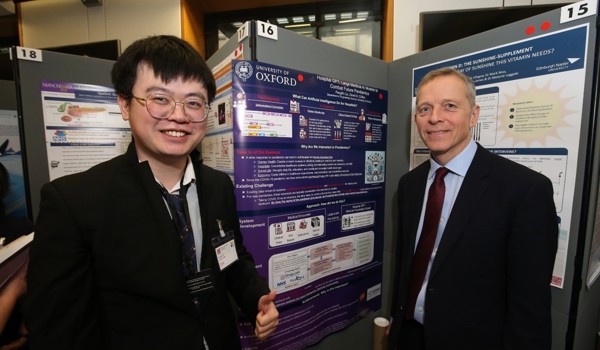Computational Health Informatics (CHI) Lab | Department of Engineering Science | University of Oxford
Welcome to the
Computational Health Informatics (CHI) Lab
Our group focuses on "AI in healthcare", sometimes known as Clinical AI, and is one of the largest labs in the Department of Engineering Science at Oxford. We provide (non-imaging) AI expertise to most Departments within Oxford's Medical Sciences Division, and others throughout the University. Members of the lab share a common interest in custom foundation models, large language models, natural language processing, probabilistic inference, and related methods. Our twin aims are to make fundamental contributions to the theory of AI in medicine (publishing via the top-tier AI venues) while also working with collaborators to produce systems that help patients. Members of the group typically go on to academic careers at Oxford and other research-intensive universities, industry (Apple, OpenAI, Amazon, etc.), and entrepreneurship (including spin-outs).
Our group has access to some of the world's largest, curated, anonymised healthcare datasets, and includes work with wearables and hospital data, across scales from the massively multivariate (including anonymised genomics) to the high-rate data acquired from medical devices. Systems developed as a result of our collaborative work are routinely used in the care of patients within the UK National Health Service, and for improving access to healthcare in low- and middle-income countries (LMICs).

Clinical collaboration is at the heart of each of our projects, with CHI Lab members working alongside clinical colleagues, which ensures that each project feeds directly into the care of patients. Please see our Research page for an overview. We are based at the Institute of Biomedical Engineering (IBME, pictured above), within the Department of Engineering Science of the University of Oxford.

CHI Lab has its second site as the "Digital Health lab" at OSCAR, the Oxford University Research Centre based in Suzhou, China, which focuses on open research using public data. In 2019, the Wellcome Trust created its first "Innovation Flagship Centre", which joins CHI Lab to the Oxford University Clinical Research Unit in Ho Chi Minh City, Vietnam, focusing on producing AI-based methods for improving healthcare in LMICs. In 2021, the European Union funded the "MOIRA" programme linking the CHI Lab to other leading AI labs across Europe. Also in 2021, we announced the Oxford-CityU Centre for Cerebro-cardiovascular Engineering, between the IBME and Hong Kong. In 2022, the Pandemic Sciences Institute was founded at Oxford, for which the CHI Lab provides its AI research theme.
Our collaborators include world-leading clinicians from the Oxford University Hospitals NHS Foundation Trust and across the university's Medical Sciences Division; specialists in LMICs from the School of Geography and the Environment; and numerous industrial bodies. Our Chinese "Digital Health" site collaborates with academic and hospital networks across China.
Our work is supported by the Engineering & Physical Science Research Council (EPSRC), the Wellcome Trust, the NHS National Institute for Health Research (NIHR), the European Union, the UK Department of Health and Social Care (DoH), the UK Medical Research Council (MRC), the UK Department for International Development (DfID), the Natural Environment Research Council (NERC), GlaxoSmithKline, AstraZeneca, Bristol Myers Squibb, NovoNordisk, UNICEF, the Gates Foundation, the Hong Kong Innovation and Technology Commission, and others.
The Institute of Biomedical Engineering, of which the CHI Lab is a part, was awarded the Queen's Anniversary Prize, which recognises research institutions that have demonstrated excellence, innovation, impact, and societal benefit. The University of Oxford and the Department of Engineering Science (in which we are based) were both recently ranked first in their respective Times Higher Education world rankings.









